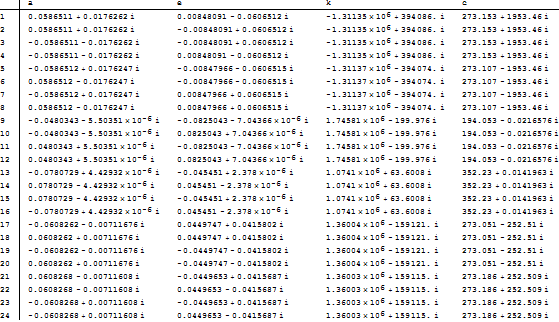I have the following four simultaneous polynomial equations
eqns = {4 a^2 k^2 (b^2 M1 M2 + I1 (M1 + M2) + I2 (M1 + M2)) ==
I1 I2 M1 M2 ω1^2 ω2^2,
4 c (a^2 + e^2) k (b^2 M1 M2 + I1 (M1 + M2) + I2 (M1 + M2)) ==
2 I1 I2 M1 M2 ζ2 ω1^2 ω2 +
2 I1 I2 M1 M2 ζ1 ω1 ω2^2,
2 (2 c^2 e^2 (b^2 M1 M2 + I1 (M1 + M2) + I2 (M1 + M2)) +
k (a^2 I2 M1 M2 + I1 ((a^2 + b^2) M1 M2 + I2 (M1 + M2)))) ==
I1 I2 M1 M2 ω1^2 +
4 I1 I2 M1 M2 ζ1 ζ2 ω1 ω2 +
I1 I2 M1 M2 ω2^2,
2 c (e^2 I2 M1 M2 + I1 ((b^2 + e^2) M1 M2 + I2 (M1 + M2))) ==
2 I1 I2 M1 M2 ζ1 ω1 +
2 I1 I2 M1 M2 ζ2 ω2};
The values of a, e, k and c are unknowns and I have values for the other parameters as follows
values = {M1 -> 4.8`, M2 -> 2.1420000000000003`, I1 -> 0.0090397`,
I2 -> 0.0115032`,
b -> 0.0275`, ω1 -> 1212.851537626128`, ω2 ->
1640.0348023828728`, ζ1 -> 0.1848599246177704`, ζ2 ->
0.11006812856373586`};
I can use NSolve and table the results
solutions = NSolve[eqns /. values];
Style[TableForm[{a, e, k, c} /. solutions,
TableHeadings -> {Automatic, {"a", "e", "k", "c"}}], FontSize -> 8]

I have 24 solutions most of them complex. How can I determine the number of solutions to expect? Can finding the number of solutions be generalised for other similar polynomial equations I will be solving? Is there a function to do this?
Thanks

Eliminate[eqns , {c,k}]. The result is a twelfth order polynomial in onlye( 12 solutions ), and an equation quadratic ina, so 2x12->24 . (I ran eliminate on a numerical example to get that.. ) $\endgroup$NSolveis correct). Are there parameters that you intend to vary? If so, what are the specifics? $\endgroup$